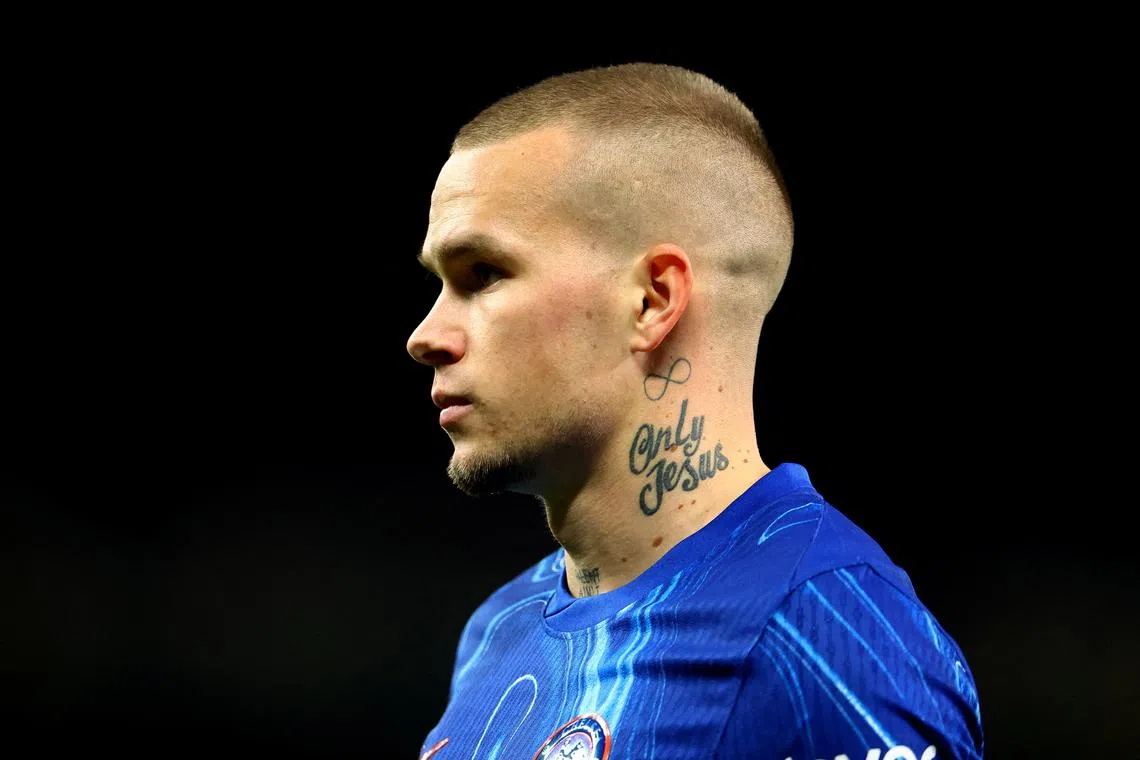Chelsea’s Mykhailo Mudryk charged by FA over doping, risks four-year ban
Sign up now: Get the biggest sports news in your inbox

Chelsea's Mykhailo Mudryk risks a four-year ban if he cannot establish that the anti-doping rule violation was not intentional.
PHOTO: REUTERS
LONDON – Chelsea winger Mykhailo Mudryk has been charged by England’s Football Association (FA) with violating anti-doping rules after failing a drug test.
The Ukraine international has not played for the Blues since Nov 28 following his provisional suspension by the FA for an “adverse finding in a routine urine test” in December.
Mudryk at the time said he was in “complete shock” and he “never knowingly used any banned substances”.
But he could now face a potential ban of up to four years under FA rules.
Confirming the 24-year-old has been charged with the offence, an FA statement on June 18 said: “We can confirm that Mykhailo Mudryk has been charged with anti-doping rule violations alleging the presence and/or use of a prohibited substance, in terms of regulations three and four of the FA’s anti-doping regulations.
“As this is an ongoing case, we are not in a position to comment further at this time.”
Signed from Shakhtar Donetsk in January 2023, Mudryk was reported to have had the prohibited performance-enhancing substance meldonium in his positive test.
Chelsea launched their own investigation into the doping allegation last year and had been waiting for the results of the ‘B’ sample test to support or contradict the initial ‘A’ results.
Under FA rules, players have the right to request analysis of the B sample from a urine test, in the event of an adverse analytical finding in an A sample.
Mudryk said on Instagram in December: “I can confirm that I have been notified that a sample I provided to the FA contained a banned substance.
“This has come as a complete shock as I have never knowingly used any banned substances or broken any rules, and I am working closely with my team to investigate how this could have happened.
“I know that I have not done anything wrong, and remain hopeful that I will be back on the pitch soon.”
Chelsea manager Enzo Maresca had also said then that he and the club trust that Mudryk did not knowingly take the banned substance.
“We support Mykhailo and trust means that we believe Mykhailo,” said the Italian.
“The club, the coaching staff and all of the people that are inside the training ground – we support, and we trust Mykhailo. Any kind of player that this kind of thing happens to, they need support – you would need support, and I would need support.”
Athletes are warned on the UK Anti-Doping website that they face a ban of four years, if it is found that a banned substance was taken intentionally.
If the violation involved a specified substance or a contaminated product, and the athlete can demonstrate they had no significant fault, ineligibility may range from two years to a reprimand, depending on the level of fault.
Earlier in June, Mudryk’s No. 10 shirt was given to Cole Palmer for next season, leaving the Ukraine international without a squad number at Stamford Bridge.
The positive test was returned shortly after he had been away on international duty with Ukraine in November.
Maresca initially said the winger was ill when asked to explain the four-game period he was absent from the team prior to the suspension being made public.
Mudryk last featured in the Chelsea squad as an unused substitute for their 3-0 Premier League win against Aston Villa on Dec 1.
His time at Chelsea has been dogged by inconsistency, with erratic performances only occasionally offset by flashes of his ability.
Mudryk has scored just 10 goals in 73 appearances in all competitions for the Blues.
He made only one Premier League start last season in a win over Wolverhampton Wanderers in August.
The Ukrainian also attended Chelsea’s Uefa Conference League final win in Poland in May, but in a private capacity and was not with the squad. AFP, REUTERS


